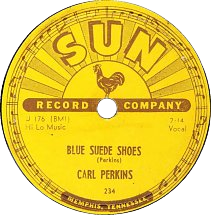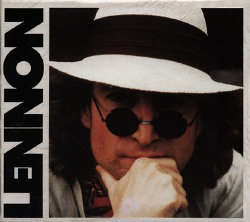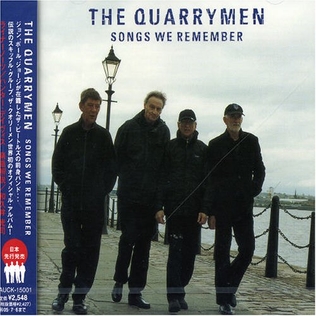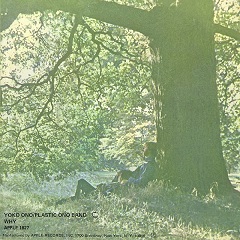
The Beatles, also referred to colloquially as the White Album, is the ninth studio album and only double album by the English rock band the Beatles, released on 22 November 1968. Featuring a plain white sleeve, the cover contains no graphics or text other than the band's name embossed. This was intended as a direct contrast to the vivid cover artwork of the band's previous LP, Sgt. Pepper's Lonely Hearts Club Band (1967). The Beatles is recognised for its fragmentary style and diverse range of genres, including folk, country rock, British blues, ska, music hall, proto-metal and the avant-garde. It has since been viewed by some critics as a postmodern work, as well as one of the greatest albums of all time. The album was the band's first LP release on their then-recently founded Apple Records after previous albums were released on Parlophone in the United Kingdom and Capitol Records in the United States.

Carl Lee Perkins was an American guitarist, singer and songwriter. A rockabilly great and pioneer of rock and roll, he began his recording career at the Sun Studio, in Memphis, beginning in 1954. Among his best-known songs are "Blue Suede Shoes", "Honey Don't", "Matchbox" and "Everybody's Trying to Be My Baby".
"How Do You Sleep?" is a song by English rock musician John Lennon from his 1971 album Imagine.

Live Peace in Toronto 1969 is a live album by the Plastic Ono Band, released in December 1969 on Apple Records. Recorded at the Toronto Rock and Roll Revival festival, it was the first live album released by any member of the Beatles separately or together. John Lennon and his wife Yoko Ono received a phone call from the festival's promoters John Brower and Kenny Walker, and then assembled a band on very short notice for the festival, which was due to start the following day. The band included Eric Clapton, Klaus Voormann, and drummer Alan White. The group flew from London, and had brief unamplified rehearsals on the plane before appearing on the stage to perform several songs; one of which, "Cold Turkey", was first performed live at the festival. After returning home, Lennon mixed the album in a day.

"Blue Suede Shoes" is a rock and roll standard written and first recorded by American singer, songwriter and guitarist Carl Perkins in 1955. It is considered one of the first rockabilly records, incorporating elements of blues, country and pop music of the time. Perkins' original version of the song appeared on the Cashbox Best Selling Singles list for 16 weeks and spent two weeks at the number two position.

"Too Many People" is a song by Paul McCartney and his wife Linda McCartney, from the 1971 album Ram. The song was issued as the B-side of the "Uncle Albert/Admiral Halsey" single, and was also included on The 7" Singles Box in 2022.

MPL Communications is the umbrella company for the business interests of Paul McCartney and was established in 1969. In addition to handling McCartney's post-Beatles work, MPL is one of the world's largest privately owned music publishers through its acquisition of other publishing companies.

"Yer Blues" is a song by the English rock band the Beatles, from their 1968 double album The Beatles. Though credited to Lennon–McCartney, the song was written and composed by John Lennon during the Beatles' retreat in Rishikesh, India. The song is a parody of blues music, specifically English imitators of blues.

Lennon is a four-CD box set compilation, featuring highlights from the solo musical career of John Lennon. It was released in 1990 and is not to be confused with the 2015 box set of the same name, which comprised Lennon's eight original studio albums on vinyl LPs.

"Birthday" is a song by the English rock band the Beatles from their 1968 double album The Beatles. Written by John Lennon and Paul McCartney, mainly by McCartney, it is the opening track on the third side of the LP. Surviving Beatles Paul McCartney and Ringo Starr performed it for Starr's 70th birthday at Radio City Music Hall on 7 July 2010.

"Why Don't We Do It in the Road?" is a song by the English rock band the Beatles, released on their 1968 double album The Beatles. Short and simple, it was written and sung by Paul McCartney, but credited to Lennon–McCartney. At 1:42, "Why Don't We Do It in the Road?" comprises 34 bars of a twelve-bar blues idiom. It begins with three different percussion elements and features McCartney's increasingly raucous vocal repeating a simple lyric with only two different lines.

"Honey Don't" is a song written by Carl Perkins, originally released on January 1, 1956 as the B-side of the "Blue Suede Shoes" single, Sun 234. Both songs became rockabilly classics. Bill Dahl of Allmusic praised the song saying, "'Honey Don't' actually outclasses its more celebrated platter-mate in some ways." It has been covered by more than 20 other artists, including the Beatles, Ronnie Hawkins and Johnny Rivers. The song has appeared in films such as The Prince of Tides, Diner, and Perfect Sisters.
"Everybody's Trying to Be My Baby" is a rockabilly song credited to Carl Perkins. Based on a 1936 song written by singer/songwriter Rex Griffin, it achieved widespread popularity when it was released in 1957 by Perkins and covered by the Beatles in 1964.
Grapefruit were a London-based British band of the late 1960s, brought together by Terry Doran of Apple Publishing, a music publishing company started and owned by the Beatles. Their brand of music was a typical late 1960s blend of rock, which they often fused with psychedelic effects such as phasers and vocoders, or classical arrangements.

Loose Ends is a posthumous compilation album by American guitarist Jimi Hendrix, released in February 1974 in the UK. It was the fourth and last Hendrix studio album released posthumously by manager Michael Jeffery. The album features a collection of outtakes and jams, with the exception of "The Stars That Play with Laughing Sam's Dice" which is the sole authorized track by Hendrix, in a new stereo mix by Eddie Kramer.
"Grow Old with Me" is one of the final songs written by John Lennon. It was first recorded by Lennon as a demo while in Bermuda. A handwritten lyric sheet for the song is dated July 5, 1980 Fairyland Bermuda. The song was first released on the posthumous album Milk and Honey in 1984. It was also rumored to be among the songs planned as a possible reunion single by his former bandmates during the making of The Beatles Anthology.

"Glad All Over" is a 1957 song recorded by rock and roll and rockabilly artist Carl Perkins, "The Rockin' Guitar Man", at Sun Records in 1957. It was released as a 45 and 78 single, Sun 287, on January 6, 1958. It was written by Aaron Schroeder, Sid Tepper, and Roy Bennett. It is not the same song as the single "Glad All Over" released in 1963 by The Dave Clark Five.

Songs We Remember is the third album by the re-incarnated version of the Quarrymen, which was the band that eventually evolved into the Beatles. It is also the final album to feature founder member Eric Griffiths before his death in 2005.

Get Back – Together is the second album by the reformed Liverpool band the Quarrymen, which was the band that, in its original conception, evolved into the Beatles. It is also the first of two albums by the band that feature all surviving founding members together, as while the name the Quarrymen name was used in the 1994 album Open for Engagements seen as the first album since the reformation, it only featured Rod Davis and part-time member John Duff Lowe. Eric Griffiths and Len Garry make their first appearances on a studio recording, with drummer Colin Hanton also returning to the band for the first time since 1959, having previously appeared on the "In Spite of All The Danger" recording in 1958 as a b-side to a cover of Buddy Holly's "That'll Be the Day". It is also the only full length album featuring Pete Shotton, who also returned to the band in 1997 but later retired due to ill health. Shotton subsequently died in 2017. The album was recorded and mixed at Liverpool Music House by record producer and engineer Lance Thomas.

"Why" is a song written by Yoko Ono that was first released on her 1970 Yoko Ono/Plastic Ono Band album. In the U.S. it was also released as the B-side of John Lennon's "Mother" single, taken from his John Lennon/Plastic Ono Band album.















